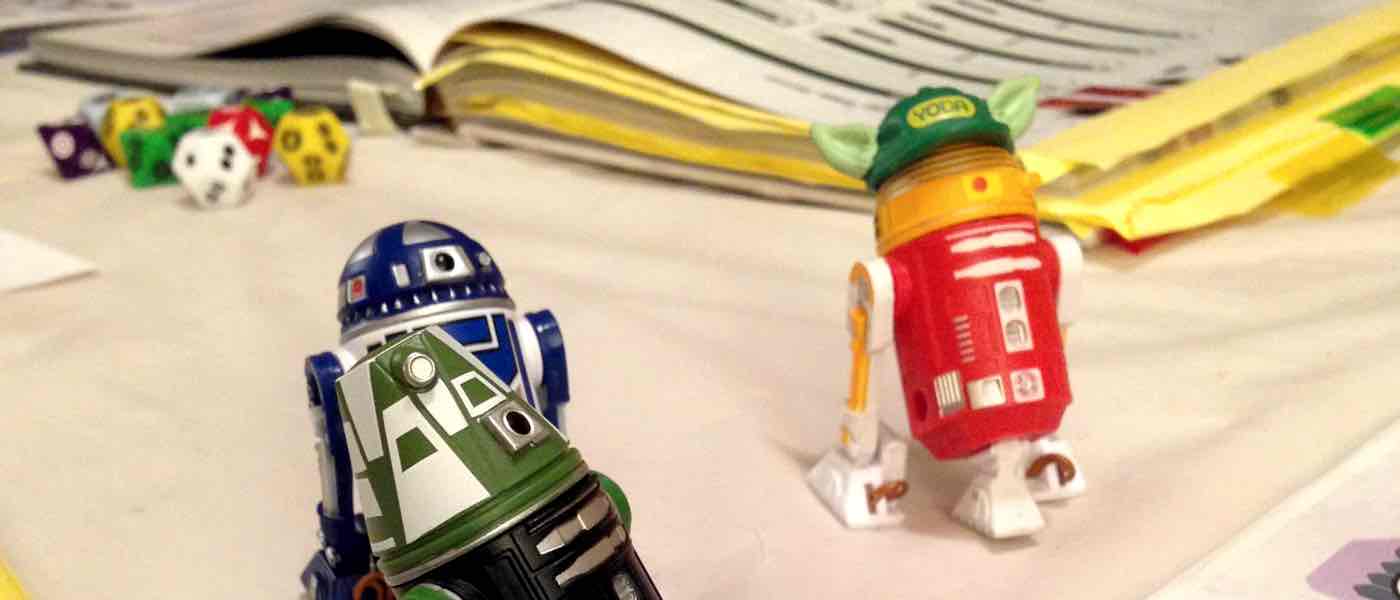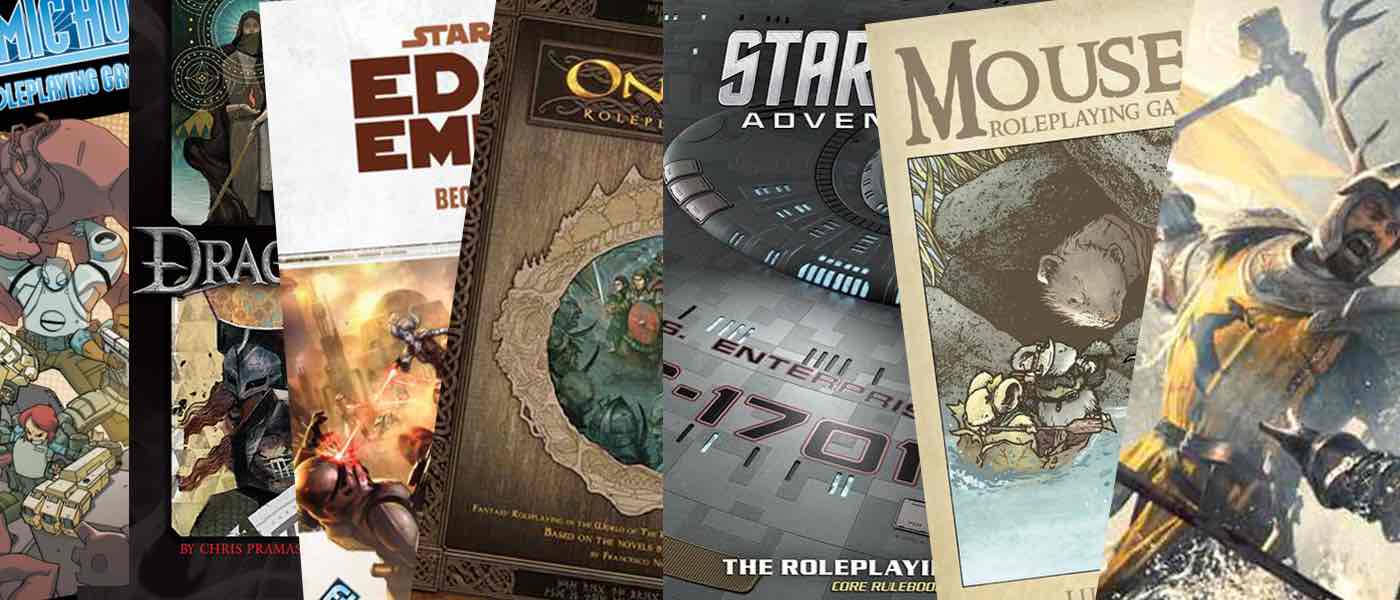From Star Trek to The Lord of the Rings – Starting with Tabletop RPGs Based on Books, TV and Movies

Just as Kleenex has become shorthand for facial tissue, Dungeons & Dragons is the name everyone associates with tabletop roleplaying. But it’s not always the first RPG people play. In fact, an unscientific online poll I ran three years ago suggests that about 40% of gamers are introduced via other games, and it looks like that trend is increasing.
Of those, many come into the hobby by way of games based on and licensed from specific books, TV shows, or movies. This trend may also be on the rise, as the ongoing sales success of Fantasy Flight Games’ Star Wars beginner boxed sets suggests.
Tabletop RPGs based on well-known books, TV shows and movies have been popular since the early days of the hobby. For example, Star Trek: The Roleplaying Game, first published in 1983 by FASA, was very popular. FASA produced a range of supplements, many of which were incorporated into official Star Trek canon. One of the first officially-licensed Teenage Mutant Ninja Turtles products was a roleplaying game, Teenage Mutant Ninja Turtles and Other Strangeness, published in 1985.
Licensed Games Can Be Ideal for Beginners
RPG publishers continue to pay to license from popular books, TV shows and movies because they know tying into a successful franchise can help them sell not just to existing roleplayers, and can also serve as an onramp into roleplaying. With that in mind, most licensed games emphasize the basics of roleplaying and are well-suited to people who have never played a tabletop RPG before.
Familiarity Breeds Fun
Using a licensed game as your point of entry into roleplaying offers two primary advantages: Built-in enthusiasm and knowledge of setting.
When you pick up a roleplaying game, most of the time the setting is new to you. It may sound intriguing based on the description on the outside of the game book and whatever reviews you’ve read, but you don’t really know if the setting will grab you until you give it a try. With a licensed property you already know, so if you’re a Lord of the Rings fan, you know The One Ring will feature elves, hobbits, lots of dangerous travel, and the wonders of Minas Tirith and Lothlórien. You’re already inclined to enjoy the setting.
If you’re a fan, you already know a lot about the setting as well. For example, you don’t have to be a completeStar Warsnerd to know the basics of the setting, who the good guys are, who the bad guys are, what kind of characters are involved, and what kind of stories unfold.
This is a big advantage if you’re new to roleplaying, because you can spend more of your attention on learning how the game mechanics work, and less on absorbing the setting.
Mind the Gap
It is important to keep a few things in mind when entering tabletop RPGs by way of a licensed game:
First, once you start playing a game, it’s your world. And your world will inevitably veer off from canon. That’s perfectly fine. If in the course of your A Song of Ice and Fire campaign House Lannister is somehow wiped out immediately after Eddard Stark is executed, so be it. One of the most, if not the most enjoyable aspects of tabletop RPGs is that players have agency — they can make things happen. Plus, it’s fun to take an existing story and put your own mark on it, moving it in a new direction.
Second, remember that the best characters stand on their own two feet. It can be tempting to want to play a character in The One Ring who is, like Bilbo Baggins, a homebody Hobbit who is called upon unwittingly to enter into a series of adventures. The gravitational pull of existing characters can be a distraction when you’re trying to create your own fully fleshed-out character. But if you can work within the setting and develop a truly unique character, you’ll have more fun in the long run, and you won’t ever feel like you’re just mimicking stories that have already been told.
Third and finally, keep in mind that in tabletop RPGs, the players don’t have as much latitude as authors and screenwriters with regard to relationships between characters. The protagonists in any roleplaying game are the characters controlled by the players. And while they may have disagreements, in general it works best if they’re working toward the same goals and not fighting each other. A bit of Han/Luke-style tension between characters adds drama, but an Obi-Wan/Anakin conflict will more than likely derail your game.

Take the Plunge
If you’ve been curious about tabletop RPGs but weren’t sure where to get started, here are a few of the most popular licensed games. One of them may be just right for you and your friends.
A Song of Ice and Fire – Whether you read the books years ago or got into George R.R. Martin’s world of scheming and treachery through the Game of Thrones TV show, this game gives you everything you need to create your own Westeros stories. While it is not tailored to beginners, the rules are clearly explained, and you can check out streamlined free QuickStart rules before you buy. [2022-10-16 - this game is now out of print]
Atomic Robo – The creator of the Atomic Robo comic collaborated in the making of this game, which uses comic book examples to help explain the mechanics. It’s particularly well-suited to beginning roleplayers.
Dragon Age – If you can’t get enough of Thedas, the world of BioWare’s hugely popular computer RPG, you may find the tabletop version enticing. The game is not aimed at beginners, but is well-written. You can grab the free QuickStart rules to get a sense of the game.
Mouse Guard – This game is a work of art. David Petersen, the creator of the Mouse Guard comics, worked hand-in-hand with the game’s designers, and it has the same lavish feel as the Mouse Guard graphic novels. The game uses highly-tailored mechanics so you can send Guard Mice on all kinds of daring adventures that evoke the spirit of the books. This is not a pick-up-and-play game, but if you love Mouse Guard you owe it to yourself to give this a look.
Star Trek – Over the years there have been several licensed Star Trek RPGs. The latest version, Star Trek Adventures was released in 2017, and shows signs of becoming a hit. You can download the free QuickStart rules to give the rules a test drive.
Star Wars – Three stand-alone games that can be mixed and matched, Edge of the Empire, Age of Rebellion, and Force and Destiny each cover a particular aspect of theStar Warsgalaxy. There’s a beginner boxed set for each of these games, designed for Star Wars fans who have never played a tabletop RPG.
The One Ring – If you’re a fan of The Hobbit and The Lord of the Rings, you owe it to yourself to check out The One Ring. This is a game with mechanics build explicitly for the setting, and the art and layout evoke the feel of Middle Earth. While not explicitly aimed at newcomers, The One Ring is a well-written, clearly defined game.
Ω